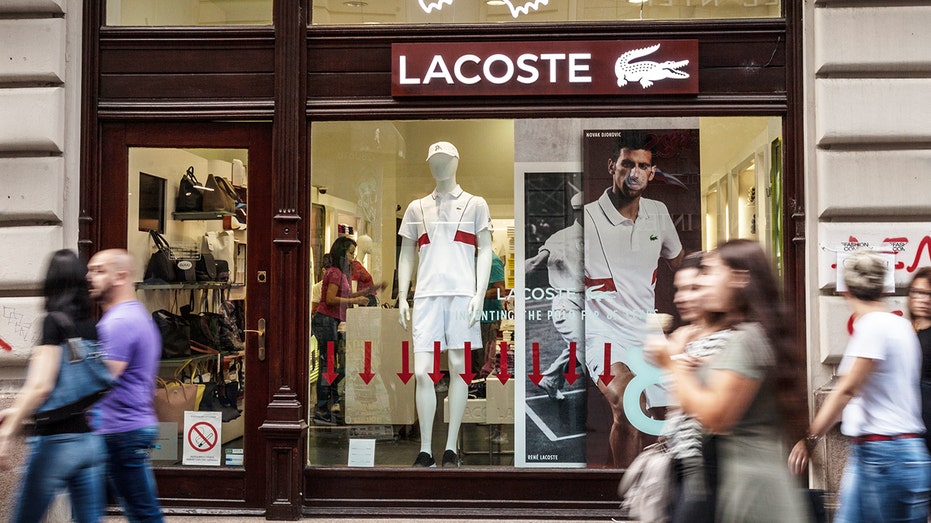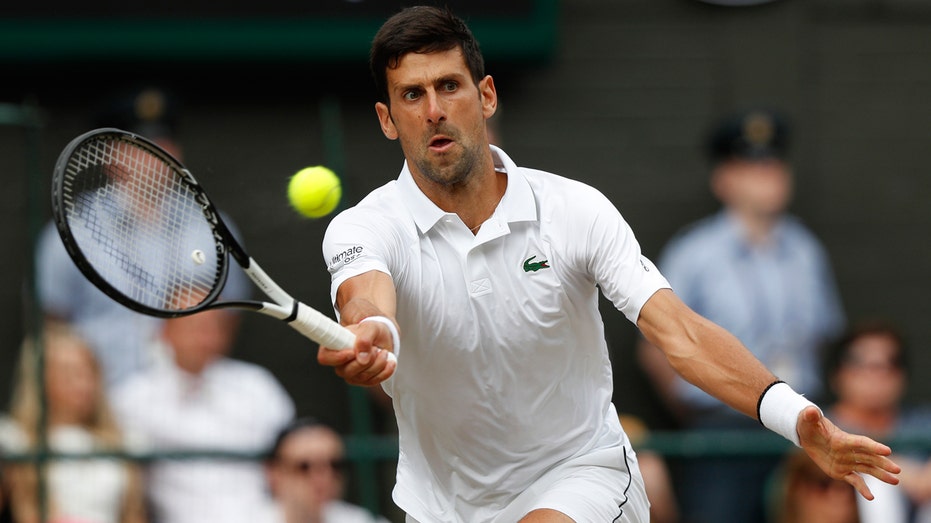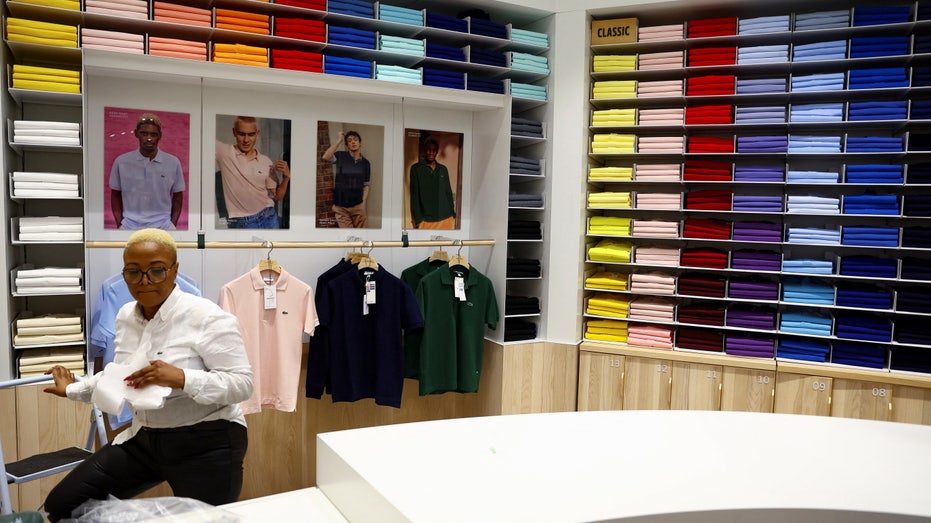Lacoste owner looks to snap up more brands as sales surge
Swiss parent MF Brands sees cash advantage as it shops for upmarket businesses
Reemergence of physical retail 'exceptionally strong' since pandemic: McGee
International Council of Shopping Centers CEO Tom McGee discusses the holiday shopping season and explains how a TikTok ban could negatively impact some retailers on "The Claman Countdown."
The parent company of Lacoste is on the hunt for acquisitions to expand its portfolio of brands after the upmarket French label reported record annual sales.
Sales at Lacoste, best known for its crocodile-logo polo shirts embraced by tennis stars, rose 26% to more than €2.5 billion, about $2.69 billion, last year, Chief Executive Thierry Guibert said in an interview. He credited the gain to attracting younger consumers in part through a more fashionable offering and buzzy collaborations with musicians and artists in recent years.
Now, Guibert is looking to do deals, hoping to repeat the rejuvenation of Lacoste elsewhere. He didn’t disclose specific targets but said he is looking for brands that have transcended borders and have at least €500 million in annual sales. Targets don’t necessarily need to be in fashion, and could be in areas like hospitality or experience, but do need to be upmarket, he said.
"What we want is to add to our portfolio of brands," said Guibert, who is also the CEO of MF Brands Group, the privately held Swiss company that owns Lacoste. "We’re in a good situation. We have cash," he said, adding that is an advantage when seeking to do deals at a time when debt has become more expensive.
LVMH SHUFFLES LEADERSHIP AT LOUIS VUITTON, DIOR

A Lacoste store with the iconic crocodile logo is shown in Belgrade, Serbia.
MF Brands’ stable of businesses already includes Gant, Aigle and the Kooples, alongside Lacoste. The company is owned by the descendants of Léon Nordmann and Ernest and Henri Maus, who first opened a department store in Lucerne, Switzerland, more than a century ago.
Looking ahead, Guibert said Lacoste is targeting sales growth of 10% this year, aiming for sales of €3 billion by 2024, up from €1 billion in 2015. He also said that some big U.S. retailers had been more prudent on orders for this year, but he expects a return of Chinese tourists to Europe to boost Lacoste’s sales in the second half of the year.
"This year will be challenging, but there are reasons for hope," Guibert said.
UNIQLO OWNER GIVES JAPAN INC A JOLT WITH 40% WAGE HIKE

Tennis star Novak Djokovic wears a Lacoste polo shirt.
MF Brands, Lacoste’s owner, has sold off assets that include Swiss DIY chain Jumbo-Markt AG and sporting-goods retailer Athleticum Sportmarkets AG in recent years to focus on affordable luxury.
The group’s strategy resembles that of Gucci-owner Kering SA, which during the 2000s jettisoned once-core retail divisions to focus entirely on consumer and luxury brands.
"It’s true that it looks a lot like what Kering did, on a smaller scale," said Guibert, who previously worked at the luxury giant for 14 years, including in its M&A department. "We’ve sold almost all of the Swiss assets, all the mass market ones," he said. "We felt value creation would come through brands and the acquisitions of brands."
MF Brands bought Lacoste in 2012 and Guibert has led something of a turnaround since joining the brand 2015.
Lacoste was founded in 1933 by René Lacoste, a top tennis player nicknamed "the Crocodile" by fans because of his tenacity on the court. Lacoste reinvented traditional tennis whites when he started wearing open-necked, short-sleeved cotton shirts on court. The brand retains a strong connection to tennis, sponsoring stars like Novak Djokovic and Venus Williams.
Under Guibert’s leadership, the brand has bought back licenses for sneakers, leather goods and underwear and put more emphasis on its own retail stores rather than wholesale to give the brand greater control.
Lacoste has also invested heavily in digital — it generated about a quarter of its sales online last year versus 4% in 2015 — and has closed smaller stores in favor of larger flagships in key locations like the Champs Elysees in Paris and Regent Street in London.
FASHION DESIGNER VIVIENNE WESTWOOD DEAD AT 81

An employee at the store of the French fashion brand Lacoste sorts out clothing in Sandton, South Africa, Oct. 28, 2022. (Reuters/Siphiwe Sibeko)
Today, Lacoste’s cotton polo shirts and other casual styles are also embraced by post-pandemic workers who seek more comfortable clothing as they switch between working at home and in the office. While remaining a wardrobe staple of the preppy country-club set, lately streetwear-enthusiast teenagers and young adults have been drawn to the brand’s brightly colored shirts and playful crocodile logo.
The company has sought to appeal to younger shoppers by adding more trendy pieces to its offering, in part through collaborating with musicians Bruno Mars and Tyler, the Creator.
"When I arrived, the brand was known, but it was less desirable to young consumers," Guibert said. "They associated it with their dad’s polo or their grandad’s."
CLICK HERE TO GET THE FOX BUSINESS APP
Lacoste is now taking its collaborative approach to creativity further, planning a future without a designer after Louise Trotter left her position as creative director of the brand last week. Guibert said he isn't looking for a replacement and that Lacoste will instead lean on its design studio and collaborations with artists and designers to add creativity and buzz. The brand also plans to tap Lacoste fans around the world for creative ideas.
"Lots of brands today are thinking about how to open the field of possibilities, rather than making themselves dependent on just one creative director," Guibert said.




















